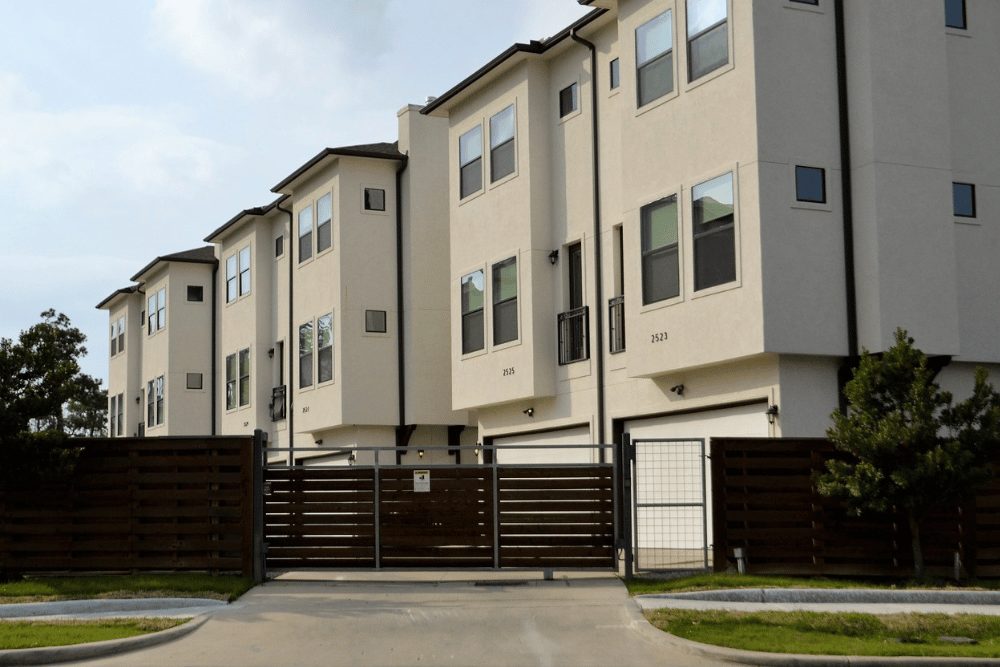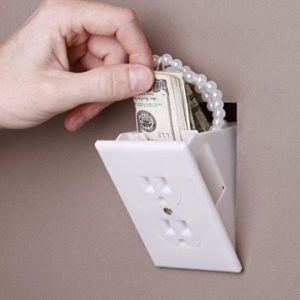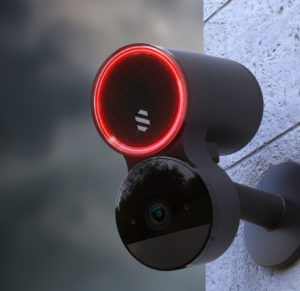Apartment Security: Don’t Become a Crime of Opportunity

Whether it’s positioning that big-screen TV or hanging artwork, adding the right personal touches to your apartment might feel like the “final step” to making it your own. But the best apartment living is more than surface-deep. It requires purposeful steps to protect it. Apartment security is vital.
Ensuring your apartment is safe and secure requires effort to make it unattractive to burglars. While there are fewer points of entry to an apartment versus a home, there is likely more foot traffic outside your front door. And with that come more opportunities for burglars, who are among the world’s greatest opportunists.
Apartment Security: What The Statistics Say
In fact, renters are more likely to experience break-ins than homeowners, according to studies by the Bureau of Justice Statistics. The highest incidence is in apartment buildings with fewer than 10 units, with those of two to four units seeing the highest number of burglaries. But no one is immune, especially during the day.
That’s because most burglaries take place between 10 a.m. and 3 p.m. when most people are working their first-shift jobs. The summer months are also ripe with opportunity. June, July, and August are high not only in temperature but also in burglaries. Burglars tend to break in, grab an average of $2,316 worth of valuables, and get back out within 10 minutes. Sadly, most burglaries are hard to solve and remain unsolved by local police departments. So, the onus for burglar proofing your apartment falls to you.
How to protect your apartment is multi-faceted. And while protecting your apartment properly can include the use of security cameras, it is so much more than that. Many of the apartment security tips below are a combination of common sense and some DIY you can put in place immediately.
Door and Window Security
If you’re on the bottom floor, take extra precautions. A first-floor apartment is more vulnerable to break-ins via both windows and doors.
Ask the landlord if the locks were changed between you and the last tenant. If not, insist on changing them.
Next, examine your door and lock to determine how to secure your apartment door. Most apartment doors have a standard lock. Even if you keep this, consider installing longer screws that make your door difficult to kick in. Ask if maintenance staff can assist with this to increase your apartment door security. (Wondering how to secure your door from being kicked in? We have tips for that.) In addition, installing a double-cylinder deadbolt or mortise lock is a simple upgrade with a big impact. Does the door have a peephole? That can be valuable.

Look at the door itself. If the apartment doesn’t have solid doors, consider investing in one. (If allowed, of course.)
Next, think about locking up. Basic security tells us to keep doors and windows locked when we’re away. Unfortunately, many people don’t lock their doors when they’re home. That’s “low-hanging fruit” for security. An easy turn of the lock is worth it. As for windows, let in the breeze when you’re home, but shut and lock them anytime you’re gone or even napping.
If you have sliding doors, think about these as well. Inserting a bar or dowel in the track easily reduces access through these doors. Do this whether you’re on the first floor or the third, as burglars can climb balconies.
And it should go without saying, but because it’s so common: Don’t leave a spare key along your door casing or under the mat. If you’re looking for how to hide a key outside your home, there are better ways.
How Light Affects Apartment Safety
Light can be a friend or foe, depending on when and how it’s used.
When hanging gauzy or sheer curtains, light is not your friend. That’s because having lamps on at night with those kinds of window treatments gives everyone out on the lawn or street a viewpoint of everything you’re doing. This includes an opportunity to see where you place valuables. Consider investing in shades, blinds, or room-darkening curtains to remove this opportunity. Burglars are known to check out an apartment before they attempt to burglarize it, so don’t advertise your goods through the windows or patio door!
Speaking of those goods: While you can’t tuck away your big-screen TV or elaborate video game console every time you leave the apartment, consider keeping smaller valuables in a safe. A fireproof safe serves a dual purpose. It’s the ideal place for cash, firearms, jewelry, irreplaceable heirlooms, and important documents. And don’t keep the safe in your bedroom, since burglars know most people store their valuables there. Mix it up by storing important items elsewhere. Get creative and store things like jewelry in odd places they don’t tend to look in right away, such as a cereal box or a fake container in the bathroom.

Conversely, make lamps (and the TV) your friend when you’re out of town or away at night. Set up your lamps and TV on a timer so they turn on and give the idea that you’re there, even if you’re not.
Pay attention to whether there is external lighting and if it’s working. Hallway lighting, motion detector lights outside entry doors, and the like should be monitored to ensure burned-out light bulbs are replaced promptly. Light is a deterrent to burglars.
Get To Know Your Neighbors
It’s always a good practice to get to know your neighbors as a neighborly gesture. But it’s also a good security practice, especially with neighbors on the sides of you and across the hall.
Together, you can create an informal “neighborhood watch” of sorts so that if anyone sees suspicious activity, you’ve got more eyes than your own on the alert. You can simply share numbers and text each other as needed. Some people find success in setting up a group text or even establishing a private Facebook group for this purpose.
Social Media Security
Speaking of social media: Be wary of what you post about your whereabouts on social media. Most burglaries are performed by someone within two miles of your apartment. And in 65% of cases, it’s someone you know. This could be an acquaintance or friend of a friend you’re connected to on Facebook or Instagram.
So, wait until you’re safely home to post about the evening’s festivities or your weekend getaway.
And consider setting high privacy settings on social media accounts to limit who even sees your pictures and posts.
Peace of Mind, Part 1: Smile, You’re On Camera
Security cameras and alarm systems have their place in the security equation, for sure.
Does the apartment building have security cameras? If not, talk to your landlord about installing some inexpensive cameras to deter burglars.

Consider purchasing your own wireless surveillance cameras or security system as well. Landlords aren’t typically fans of tenants using wired systems. The good news is that the wireless systems can easily be secured to your apartment’s doors and windows. A video doorbell and lock system may be a great fit here, as it notifies you or creates a noise when someone tries to enter. Another option is the Deep Sentinel wireless security camera. It sends notifications to your phone and uses live surveillance guards to stop a burglary before it happens through two-way audio communication. These smart security cameras use artificial intelligence to scope out anything suspicious in real time. If you’re wondering how to protect your apartment, an ounce of prevention is worth more than a pound of cure.
Peace of Mind Part, 2: Renter’s Insurance
If you follow all of these tips and your apartment is still burglarized, don’t panic. That’s why you have renter’s insurance. Items such as TVs, laptops, electronics, and jewelry are easy grabs that add up fast. Remember, while these items are easily replaced. Grandma’s pearl necklace and your heirlooms are not. So be sure to store invaluable items carefully, as noted above.
The Security Line
Together, these steps will help to establish the security you need for your apartment to be a true safe haven. A few proactive efforts can make your apartment unappealing to burglars, who will look elsewhere for easier pickings.